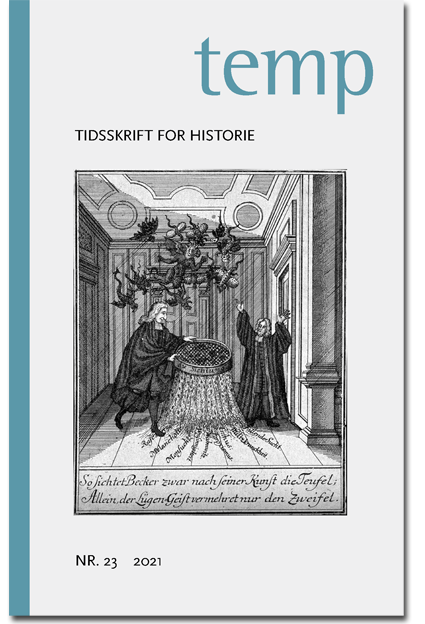BLOD, BIND OG LIGESTILLING
EN FRAMEANALYSE AF UNICEFS NARRATIVER OM MENSTRUATION
Nøgleord:
Menstruation, Frame-analyse, UNICEF, LigestillingResumé
In recent years, and particularly since 2015, menstruation and the dificulties as- sociated with it have gained more attention on the global agenda. UNICEF has been one of the key actors in the ield of menstruation and menstrual hygiene ma- nagement (MHM). Based on Chris Bobel’s critique of the MHM-sector, this article examines UNICEFs narrative of menstruation and MHM and discusses the pro- blems this can lead to, based on an analysis of how UNICEF frames the dificulties associated with menstruation and MHM. The methodology used is Rhys H. Wil- liams’ frame analysis, within the theoretical framework of diversity feminism.
In the article, I present Bobel’s criticism in three main points regarding the MHM-sector’s narrative and framing of the problems tied to menstruation and MHM. Even though some of these problems are also found in UNICEF’s narrati- ve and framing, I show that they are becoming more nuanced in their views on MHM and highly attentive to the speciic context in which they work. According to UNICEF, it is important to include both the practical, physical, social, and cul- tural issues in the work to improve menstruation experience. Their view is there- fore shown to be more nuanced than one could expect based on Bobel’s critique.
Referencer
Publiceret materiale
Abbott, H. Porter: The Cambridge Introduction to Narrative, Cambridge: Cambridge University Press, 2009.
Bobel, Chris: The Managed Body: Developing Girls and Menstrual Health in the Global South, Cham: Springer International Publishing, 2019.
Bobel, Chris, Inga T. Winkler, Breanne Fahs, Katie Ann Hasson, Elizabeth Arveda Kissling og Tomi-Ann Roberts (red.): The Palgrave Handbook of Critical Menstruation Studies. Singapore: Springer Nature. 2020, doi: https://doi.org/10.1007/978-981-15-0614-7.
Columbia University og UNICEF: "MHM in Ten: Advancing the MHM Agenda in WASH in Schools", New York, 30. oktober 2014.
Dietz, M. G.: "Current Controversies in Feminist Theory", Annual review of political science, 6, 2003, 399-431, doi: https://doi.org/10.1146/annurev.polisci.6.121901.085635.
Dr.dk, 25. maj 2020, Charlotte Kowal: "Nu bliver det gratis at have menstruation i Skotland". https://www.dr.dk/nyheder/udland/nu-bliver-det-gratis-have-menstruation-i-skotland (13. december 2020).
Gibson, Leisa, Brooke Yamakoshi, Lizette Burgers og Patty Alleman: "Guidance on Menstrual Health and Hygiene", New York: UNICEF, Programme Devision/WASH, marts 2019, https://www.unicef.org/wash/files/UNICEF-Guidance-menstrual-health-hygiene-2019.pdf (5. januar 2021).
Goffman, Erving: Frame Analysis: An Essay on the Organization of Experience. Cambridge, Mass: Harvard University Press, 1974.
Herr, Ranjoo Seodu: "Reclaiming Third World Feminism: or Why Transnational Feminism Needs Third World Feminism", Meridians (Middletown, Conn.), 12 (1), 2014, 1-30, doi: https://doi.org/10.2979/meridians.12.1.1.
Johnston-Robledo, Ingrid og Joan C. Chrisler: "The Menstrual Mark: Menstruation as Social Stigma", Sex Roles, 68, 2013, 9-18, doi: https://doi.org/10.1007/s11199-011-0052-z.
Kowalski, Robin M. og Tracy Chapple: "The Social Stigma of Menstruation: Fact or Fiction?", Psychology of Wome Quarterly, 24, 2000, 74-80.
Mertova, Patricie og Leonard Webster: Using Narrative Inquiry as a Research Method: An Introduction to Critical Event Narrative Analysis in Research, Teaching and Professional Practice, London: Routledge, 2020.
Polletta, Francesca og James M. Jasper: "Collective Identity and Social Movements", Annual Review of Sociology, 27 (1), 2001, 283-305, doi: https://doi.org/10.1146/annurev.soc.27.1.283.
Roeckel, Sophia, Anne Cabrera-Clerget og Brooke Yamakoshi: "Guide to Menstrual Hygiene Materials", New York: UNICEF, Supply Division & Programme Division, maj 2019, https://www.unicef.org/wash/files/UNICEF-Guide-menstrual-hygiene-materials-2019.pdf (5. januar 2021).
Runyan, Anne Sisson og V.Spike Peterson: Global Gender Issues in the New Millenium, Boulder: Westview Press, 2014.
Snow, David A., E. Burke Rochford, Steven K. Worden og Robert D. Benford: "Frame Alignment Processes, Micromobilization, and Movement Participation", American Sociological Review, 51 (4), 1986, 464-481, doi: https://doi.org/10.2307/2095581.
Sommer, Marni, Bethany A. Caruso, Murat Sahin, Teresa Calderon, Sue Cavill, Therese Mahon og Penelope A. Phillips-Howard: "A Time for Global Action: Addressing Girls’ Menstrual Hygiene Management Needs in Schools", PLoS medicine, 13 (2), e1001962, 2016, doi: https://doi.org/10.1371/journal.pmed.1001962.
Sommer, Marni, Jennifer S. Hirsch, Constance Nathanson og Richard G. Parker: "Comfortably, Safely, and Without Shame: Defining Menstrual Hygiene Management as a Public Health Issue", American Journal of Public Health (1971), 105 (7), 2015, 1302-1311, doi: https://doi.org/10.2105/ajph.2014.302525.
Sommer, Marni og Murat Sahin: "Overcoming the Taboo Advancing the Global Agenda for Menstrual Hygiene Management for Schoolgirls", American Journal of Public Health, 103 (9), 2013, 1556-1559, doi: https://doi.org/10.2105/AJPH.2013.301374.
UNICEF og WHO: "Consultation on Draft", WHO/UNICEF Joint Monitoring Programme (JMP) for Water Supply and Sanitation, 2012.
"UNICEF Gender Action Plan.” 13. juli 2017. Dokumentnr.: E/ICEF/2017/16. United Nations Economic and Social Council.
UNICEF: "UNICEF Strategic Plan 2018-2021", New York: UNICEF, Devision of Communication, januar 2018, https://www.unicef.org/media/48126/file/UNICEF_Strategic_Plan_2018-2021-ENG.pdf (5. januar 2021).
UNICEF: “Gender Action Plan 2018-2021”, 2018, https://www.unicef.org/gender/files/Gender_Action_Plan_brochure-web.pdf (5. januar 2021).
UNICEF og WHO: "Progress on Household Drinking Water, Sanitation and Hygiene 2000-2017", New York, 2019, https://www.unicef.org/reports/progress-on-drinking-water-sanitation-and-hygiene-2019 (5. januar 2021).
UNICEF: "Goal Area 4: Every Child Lives in a Safe and Clean Environment: Global Annual Results Report 2019", juni 2020, https://www.unicef.org/reports/global-annual-results-2019-goal-area-4 (5. januar 2021).
Weiss-Wolf, Jennifer: Periods Gone Public: Taking a Stand for Menstrual Equity, New York: Skyhorse Publising Inc., 2019.
WHO, UNFPA og UNICEF: "The Reproductive Health of Adolescents: A Strategy for Action", Geneva: World Health Organization, 1989.
Williams, Rhys H: "Movement Dynamics and Social Change: Transforming Fundamentalist Ideology and Organizations". I Martin E. Marty og R. Scott Appleby (red.): Accounting for Fundamentalisms: The Dynamic Character of Movements, 785-833, Chicago: University of Chicago Press, 1994.
Yagnik, Arpan: "Theorizing a Model Information Pathway to Mitigate the Menstrual Taboo", Health Promotion International, 24, 2019, 410-419, doi: https://doi.org/10.1093/heapro/dax089.
Downloads
Publiceret
Citation/Eksport
Nummer
Sektion
Licens
Copyright temp - tidsskrift for historie og forfatterne.
Artikler publiceret i Temp må citeres, downloades og videresendes for ikke-kommerciel brug, under forudsætning af normal akademisk reference til forfatter(e) samt tidsskrift, årgang, nummer og sider. Artiklerne må kun genudgives med eksplicit tilladelse fra forfatter(e) og tidsskriftet.





